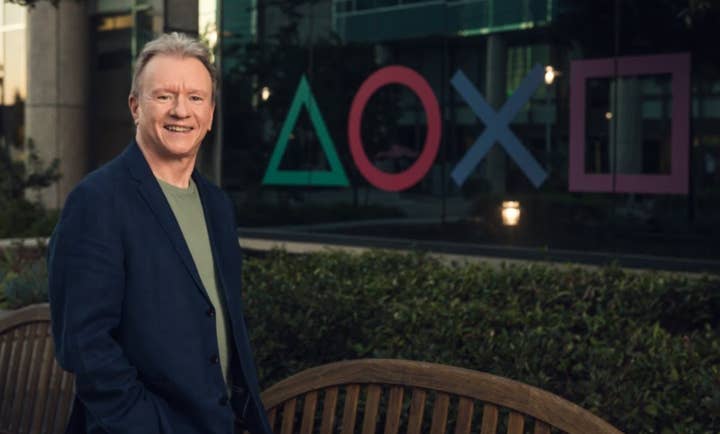PlayStation's Jim Ryan: Our games could suffer if they went straight into PS Plus
The platform holder's CEO discusses the potential for games subscription services
Whenever a new platform or service gets announced, the focus is inevitably on what's missing rather than what's there.
Sony's new PS Plus subscription offerings boast online multiplayer access, hundreds of PS4 and PS5 games, streaming, retro titles and game trials. But what it doesn't include, unlike its main competitor, are new first-party games that launch in the service at the same time as they come out at retail.
"We feel like we are in a good virtuous cycle with the studios," explains PlayStation CEO Jim Ryan, "where the investment delivers success, which enables yet more investment, which delivers yet more success. We like that cycle and we think our gamers like that cycle."
He continues: "[In terms of] putting our own games into this service, or any of our services, upon their release... as you well know, this is not a road that we've gone down in the past. And it's not a road that we're going to go down with this new service. We feel if we were to do that with the games that we make at PlayStation Studios, that virtuous cycle will be broken. The level of investment that we need to make in our studios would not be possible, and we think the knock-on effect on the quality of the games that we make would not be something that gamers want."

Ryan's view on this isn't unique to Sony. Most AAA publishers are reluctant to put their most recent games into subscription services. The counter argument is that by putting your latest titles into PS Plus or Xbox Game Pass, you're potentially widening your audience. Overnight, your new release could have tens of millions of players, and if your game has other forms of monetisation in it, then the revenue potential is significant.
And even if your game doesn't have microtransactions, Xbox believes that subscriptions -- combined with streaming -- is the key to finding new console players.
Ryan's perspective is a pragmatic one, and PlayStation's current position on this is entirely subject to change.
"The way the world is changing so very quickly at the moment, nothing is forever," he tells us. "Who would have said even four years ago that you would see AAA PlayStation IP being published on PC? We started that last year with Horizon Zero Dawn, then Days Gone, and now God of War -- a hugely polished and accomplished PC version of that game. [We've had] great critical success and great commercial success, and everybody has made their peace with that happening and is completely at ease with it. I look back four years and think nobody would have seen that coming.
"The way our publishing model works right now [putting new games straight into PS Plus] doesn't make any sense. But things can change very quickly in this industry"
"So I don't want to cast anything in stone at this stage. All I'm talking to today is the approach we're taking in the short term. The way our publishing model works right now, it doesn't make any sense. But things can change very quickly in this industry, as we all know."
Outside of what PlayStation isn't doing with its new PS Plus subscription options, it's worth talking about what it is doing.
At a basic level, it is bringing together its PlayStation Plus and PlayStation Now subscription services, which together total 50 million subscribers. 75% of PS Now subscribers also subscribe to PS Plus, so it makes sense to unite the two services together. And for those 75%, they'll find their overall costs going down.
Looking at pricing generally, there are three tiers to PS Plus. PS Plus Essentials is identical to PS Plus today and is priced the same ($10 a month), PS Plus Extra adds in a library of PS4 and PS5 games ($15 a month), whereas PS Plus Premium includes all that plus game trials, game streaming and a collection of PS1, PS2, PS3 and PSP games ($18).
In comparison to Xbox's offerings, the PS Plus Premium tier carries a highly monthly cost. However, where Sony has been competitive is with the annual pricing.
"It is a fact -- for our services at least -- that the great majority of people subscribe through a 12-month subscription," Ryan explains. "It's more than two thirds who subscribe that way. That is an area of value proposition that we have looked at very hard. What we are delivering is that, for a 12-month subscriber, and that is the great majority of people, the monthly subscription rate for PlayStation Plus Extra will be $8.33. And for PlayStation Plus Premium it will be $9.99. We think, for what people are going to get, this is a terrific value proposition. And one that simply wouldn't be possible if we were to put our studios' games into the service upon their release."
Sony may not be putting its latest releases in, but there's still some popular PS5 titles in PS Plus Extra and Premium, including Spider-Man: Miles Morales and Returnal. But outside of its first-party games, Sony says "every major publisher" is present in the service, and conversations continue to go well.
"Whether it's indies, whether it's big games, or things that celebrate our heritage... all sorts of games," Ryan says. "We are going to have all of it, and hopefully a line-up that ticks all sorts of boxes."

The Premium option is more of a specialist tier. And one of its big draws is the collection of retro games.
"Obviously, it's not for everybody, which is why it is in the Premium tier," Ryan says. "But there are people like me who have been around forever, who have played those games and loved those games 20-odd years ago. Or maybe it's people whose parents rave on about these games and want to try them for themselves. Once we can share the line-up with the world, we think there's going to be a lot of interest in that."
Streaming is also within the Premium tier. Again, like retro, it isn't for everyone, although Ryan expects it will become a more meaningful part of Sony's business in time.
Sony feels it has done a good job with PS5 so far. Manufacturing challenges aside, it has a console that's been well received, particularly the controller. Its exclusive games, despite some delays, have performed well, including the recent releases of Horizon Forbidden West and Gran Turismo 7. The one element arguably missing is in its services, and that's what this new PS Plus offering is designed to address.
Yet even if it doesn't immediately attract new customers, there is an existing audience of 48 million PS Plus subscribers to convince to upgrade, including those in countries where PS Now was never an option.
"It's about rounding off the offer that we have," Ryan explains. "With platforms, it is seldom just one single thing that makes a platform really attractive. It's a combination of many things. And having a really strong service proposition definitely helps.
"Clearly, within our existing audience base we have the opportunity to attract PlayStation owners who are not PlayStation Plus subscribers at present. The additional opportunity is the 48 million PlayStation Plus subscribers and get them to trade-up to Extra or to Premium. And our task is made rather easier there by the fact that they are existing PlayStation Plus subscribers, so we have an extremely close relationship with them on many levels."
"I don't think we'll see [games subscriptions] go to the levels that we see with Spotify and Netflix"
The subscription business model in video games is a growing one. Xbox announced in January it has over 25 million subscribers to Game Pass, and that number keeps on rising. What's not so clear is the ultimate potential of all this... could it possibly become the dominant model in games like it has with music and TV? Ryan isn't convinced.
"Subscription has certainly grown in importance over the course of the last few years," he concludes. "Our PlayStation Plus subscriber number has grown from zero in 2010, to 48 million now. And we anticipate, for our services, that we will see further growth for the subscriber number.
"But the medium of gaming is so very different to music and to linear entertainment, that I don't think we'll see it go to the levels that we see with Spotify and Netflix.
"Some of the live service [games] that are proving very successful these days, and I'm not restricting this comment to console, they're effectively subscription services in themselves. And they're very much tailored to the needs of the gamer who loves whatever game that they spend hours and hours with, month after month after month. That phenomenon of the live service game... that has, in a very large part, fuelled the enormous growth in the gaming industry that we've seen over the last ten years. I think that trend towards live services will continue, and if you look for a model in our category of entertainment, which supports sustained engagement over a long period of time, live services games arguably fit that bill better than a subscription service.
"But it's all about choice. There are obviously many millions of people who are happy to subscribe to PlayStation Plus. We offer them that option on the platform, and we think that we are offering a significantly improved option with the changes we have made. Equally, if people want to play Fornite or Call of Duty or FIFA, and have their sustained engagement that way, that's fine, too. Nobody is obliged to do anything."









